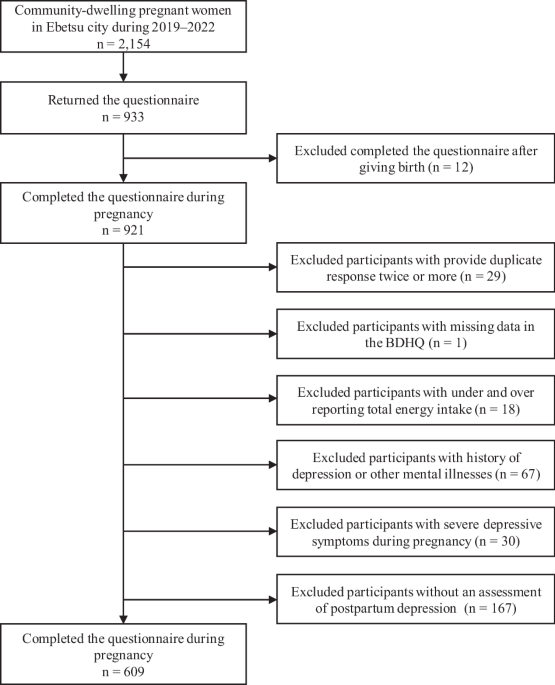
- Select a language for the TTS:
- UK English Female
- UK English Male
- US English Female
- US English Male
- Australian Female
- Australian Male
- Language selected: (auto detect) - EN
Play all audios:
The effect of the frequency of nighttime snacking during pregnancy on postpartum depression (PPD) remains unclear. This prospective cohort study aimed to explore the association between the
frequency of nighttime snacking during pregnancy and the incidence of PPD.
This study included 609 community-dwelling pregnant women who were recruited between July 2019 and July 2022. Data on the frequency of nighttime snacking and sociodemographic, economic, and
lifestyle factors were obtained using self-administered questionnaires. Data on dietary intake were obtained using a validated brief self-administered diet history questionnaire. PPD was
assessed using the Japanese version of the Edinburgh Postnatal Depression Scale (EPDS). The incidence of PPD (EPDS score of ≥9) based on the frequency of nighttime snacking was analyzed
using multiple logistic regression analysis.
After adjusting for potential confounding factors, the odds ratio (OR) of PPD in participants who had a frequency of nighttime snacking 3 times/week or more compared with those who had a
frequency of nighttime snacking less than 1 time/week was 2.59 (95% confidence interval, 1.14–5.86). Sensitivity analysis was repeated for the excluded participants with depressive symptoms
during pregnancy, yielding similar results. The OR of PPD in those who indulged in nighttime snacking ≥3 times/week was the highest (2.81; 95% confidence interval, 1.13–6.96).
The present study clarified the association between the frequency of nighttime snacking and PPD. Further studies with large and diverse samples are needed to overcome any potential selection
bias.
This study data is available in supplementary files in the published article.
We thank Yuka Takeuchi, the staff of the Department of Health and Welfare of Ebetsu City for assistance during the course of this study.
This study was supported by a Grant-in-Aid for Scientific Research from the Ministry of Education, Culture, Sports, Science and Technology of Japan [grant number JP19K19465].
Department of Food Science and Human Wellness, Rakuno Gakuen University, 582 Bunkyodai-Midorimachi, Ebetsu, 069-8501, Japan
Department of Health Sciences, School of Medicine, University of Yamanashi, 1110 Shimokato, Chuo, 409-3898, Japan
Health Care Science Institute, 3-2-12 Akasaka, Minato-ku, Tokyo, 107-0052, Japan
TK conceived and designed the study. TK drafted the manuscript, and RK and EO reviewed and edited it. TK conducted the analysis. All the authors have read and approved the final manuscript.
This study was conducted in accordance with the guidelines of the Declaration of Helsinki, and the study protocol was approved by the Ethics Committee of Rakuno Gakuen University (2019, No.
19-1). Written informed consent was obtained from all participants.
Publisher’s note Springer Nature remains neutral with regard to jurisdictional claims in published maps and institutional affiliations.
Springer Nature or its licensor (e.g. a society or other partner) holds exclusive rights to this article under a publishing agreement with the author(s) or other rightsholder(s); author
self-archiving of the accepted manuscript version of this article is solely governed by the terms of such publishing agreement and applicable law.
Anyone you share the following link with will be able to read this content:



